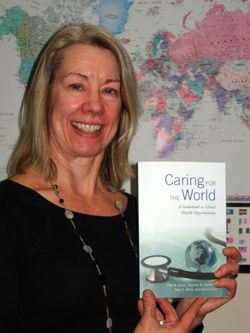 |
Sara Pirtle, coordinator of UNMC’s International Studies and Programs, with the book she co-authored, “Caring for the World: A Guidebook to Global Health Opportunities.” |
Coordinator of UNMC’s International Studies and Programs, Pirtle, has co-authored a book, “Caring for the World: A Guidebook to Global Health Opportunities.”
Printed by the University of Toronto Press, the book will be released for distribution next year.
“It’s the first comprehensive resource for anyone interested in improving the lives of people around the world through global health and medicine,” Pirtle said.
Her co-authors are Paul Drain, M.D., an internal medicine resident at Stanford University in Palo Alto, Calif.; Stephen Huffman, M.D., emergency physician in Dayton, Ohio; and Kevin Chan, M.D., a pediatrician in Toronto.
How this story unfolds is a lesson in degrees of separation in this shrinking world of ours.
Four years ago, Pirtle received an e-mail from Dr. Drain, who was a medical student at the University of Washington at the time. He had gotten her contact information from Dr. Huffman in Ohio. The two wanted to develop a comprehensive resource on global health and needed help.
“The Ohio doctor told the Washington student, ‘there’s a woman in Nebraska who knows about this.’ Somehow, he knew of me,” she said.
A big fish in a small pond does get noticed.
While the world is big, the global health community is small. Pirtle speaks fluent Spanish and has traveled to a dozen Latin American countries. As coordinator of UNMC’s program for the past 10 years, she has processed paperwork for foreign students who come here and for all UNMC students who want to study abroad.
She also is adviser for the Student Alliance for Global Health, which organizes annual medical service trips to Nicaragua, Jamaica, Costa Rica, and an American Indian Reservation. Pirtle personally guides the group of students going to Nicaragua every year. In preparation for the trip, she makes students learn about the country and its culture for months before going.
“We’re not tourists; we’re going there to help. We return to the same communities where we have a good reputation,” she said.
The teams take medical supplies with them, including donated pharmaceutical drugs.
In 2005, Pirtle helped launch the first Midwest Global Health Conference in Omaha, and has been instrumental in organizing subsequent conferences ever since. On the international scene, she served two terms on the governing council for the Global Health Education Consortium (GHEC), based in San Francisco. And, she co-chaired the GHEC’s 2004 international conference in Guatemala.
GHEC is a consortium of faculty and health care educators dedicated to global health education in health professions schools and residency programs. It is committed to improving the health and human rights of underserved populations.
Pirtle cast a skeptical eye at the e-mail. “I’ve been behind the scenes in book deals before and I know how much work is involved,” she said. But then, the e-mail was followed up with a call from Dr. Drain.
Pirtle was hooked. “I knew a book like this was needed and that, when finished, it would be a great accomplishment,” she said.
The group subsequently added a fourth author, pediatrician Kevin Chan, M.D., of Toronto, who has expertise in global health. They brought the book to fruition with countless conference calls and e-mails and much writing and editing in between. The four authors have never been together in person and not all of them have personally met each other.
|
|
She also asked Keith Brown, D.O., a Norfolk family physician and assistant professor and UNMC volunteer faculty member, to contribute an essay to the chapter – Advice From Five Global Health Experts. Dr. Brown is medical director for the Belize Institute for Tropical and Wilderness Medicine and spends 50 percent of his time abroad.
The book is an important resource for health professionals who want to enter the global health field, Pirtle said.
“There are pitfalls when trying to provide health care in a foreign country,” she said. “First, you have to learn the culture. Then, you work with the local health care providers to get their permission to treat people. It’s important to remember that in poor countries, people can’t purchase expensive medications. So, whatever drugs you bring in should be accessible to the people.”
Language is another key and Pirtle advises everyone to learn Spanish. “Every health profession student will encounter a Spanish-speaking patient and if they can’t speak the language and understand the patient, they won’t be able to provide excellent care.”
All of these topics and more are covered in the book, which sells for $60 in hardcover and $24.95 in paperback. The book can be preordered from UT Press, as well as from Amazon, Borders and Barnes and Noble. It will be available early this month.
Pirtle, who likens the publishing process to birthing a baby, said she is now walking on sunshine and would be happy to autograph individual copies of the book. “Just e-mail me.”